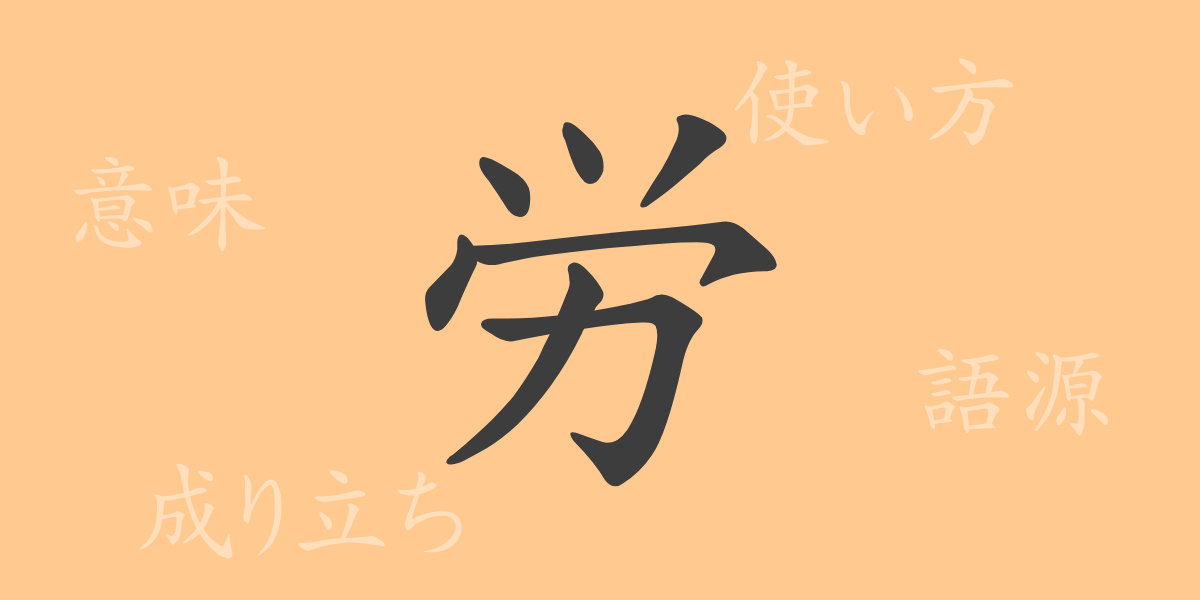The beauty of the Japanese language is reflected in its characters. Each kanji (かんじ) has a history, and its shape and meaning conceal deep backgrounds. This time, we focus on the kanji “労” (ろう), which is a common kanji in Japan and closely related to our daily lives, exploring its charm and significance. From “労働” (ろうどう, labor) to “労をねぎらう” (ろうをねぎらう, appreciating effort), what stories are embedded in this kanji rooted in our lives? Let’s delve deeply into the world of “労” through this article.
The Origin of 労 (ろう)
The kanji “労” (ろう) has its origins in ancient China. This character, which evolved from the pictographic oracle bone script, originally depicted “an old person walking with a cane.” Over time, its meaning expanded to encompass all acts of effort and hardship, such as “苦労する” (くろうする, to struggle) and “骨を折る” (ほねをおる, to exert oneself). The kanji representing “労” symbolizes the necessity of effort and hardship in human life.
The Meaning and Usage of 労 (ろう)
The kanji “労” (ろう) is often used to signify “exerting effort” or “struggling,” as seen in words like “労働” (ろうどう, labor) and “労作” (ろうさく, toil). Additionally, in the form “労る” (いたわる), it conveys the meaning of caring for someone’s efforts and struggles. This word carries a nuance of respecting and acknowledging the contributions of others.
The Reading, Stroke Count, and Radical of 労 (ろう)
The kanji “労” (ろう) offers deep insights both in its structure and meaning.
- Reading: In on’yomi (おんよみ, Chinese reading), it is read as “ろう” (ろう), and in kun’yomi (くんよみ, Japanese reading), it is read as “ねぎらう” (ねぎらう), “いたわる” (いたわる), and “いたずらに” (いたずらに).
- Stroke Count: “労” (ろう) has a total stroke count of 7.
- Radical: The radical is 力 (ちから, power).
Idioms, Phrases, and Proverbs Using 労 (ろう) and Their Meanings
There are numerous idioms, phrases, and proverbs that include the kanji “労” (ろう). Here are a few examples:
- 労働 (ろうどう): Working or the act of working.
- 労力 (ろうりょく): The physical or mental effort required for a task.
- 苦労 (くろう): Enduring difficulties and hardships while making an effort.
- 労をねぎらう (ろうをねぎらう): Acknowledging and showing gratitude or consolation for someone’s efforts and hardships.
- 無駄労力 (むだろうりょく): Futile effort that does not yield results.
- 労多くして功少なし (ろうおおくしてこうすくなし): A lot of effort with little to show for it.
Summary of 労 (ろう)
The kanji “労” (ろう) holds more than just a literal meaning; it is deeply rooted in our lives and culture. The dignity of work, the value of hardship, and the heart to appreciate people’s efforts—all of these are expressed within “労” (ろう). By incorporating the lessons embedded in this single character into our daily lives and truly understanding and respecting others’ efforts, we can build a richer society.
“`

























